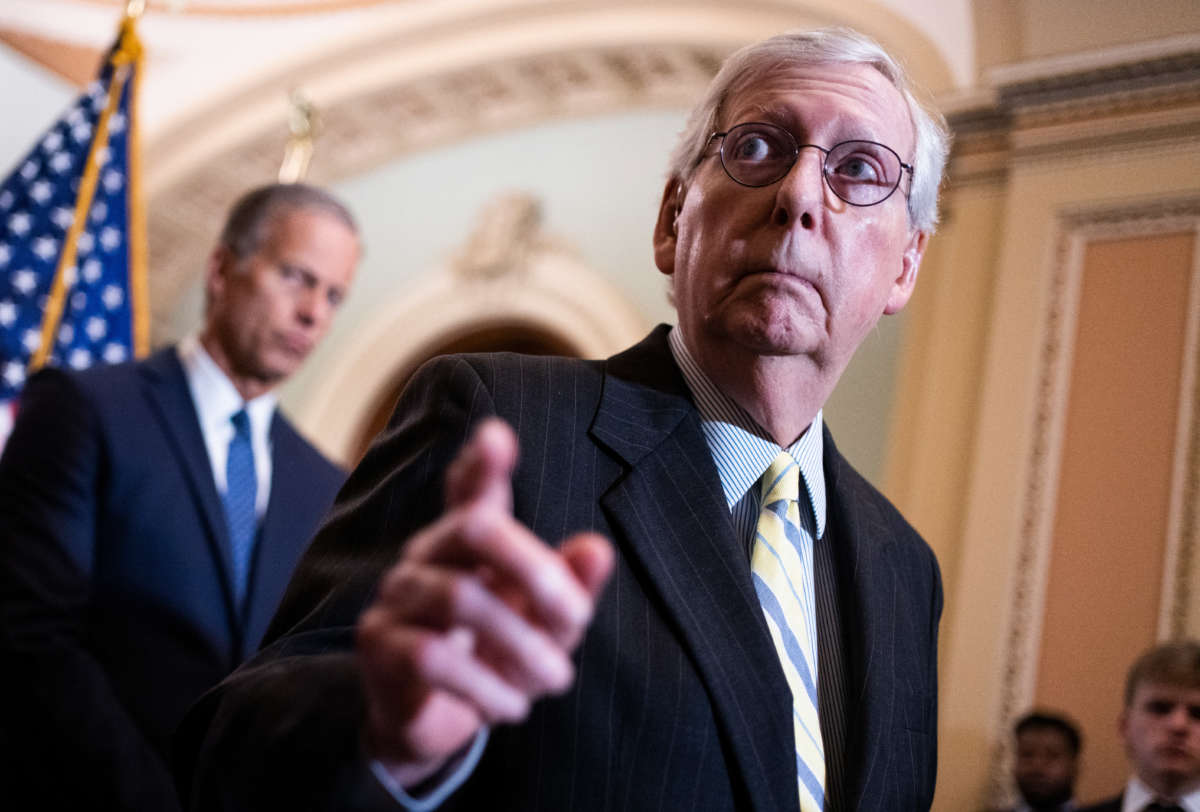Senate Minority Leader Mitch McConnell (R-Kentucky) is facing widespread criticism for his recent assertion that the so-called labor shortage in the U.S. is the result of the stimulus checks that were sent out over a year ago.
At an event in Kentucky on Tuesday, McConnell said that the $3,400 in direct aid sent out to American taxpayers over the past two years has been holding people back from working — a misleading statement in several respects, especially considering the fact that unemployment is currently quite low, with some states documenting record low unemployment over the past few months.
“You’ve got a whole lot of people sitting on the sidelines because, frankly, they’re flush for the moment,” McConnell said, according to Insider. “What we’ve got to hope is once they run out of money, they’ll start concluding it’s better to work than not to work.”
Sen. Elizabeth Warren (D-Massachusetts) condemned McConnell’s statement on Twitter on Wednesday. “Mitch McConnell’s blaming Americans for not wanting to work. It’s absurdly out of touch,” she said. “More workers have jobs now than pre-COVID. Investing in affordable child care would help parents return to work, but Republicans refuse to support actual solutions.”
Indeed, it is absurd to suggest that the checks, which were aimed at combating COVID-related financial and employment problems, could be a lifeline for struggling families years after they were sent out.
Although the stimulus checks and expanded child tax credit did help decrease financial hardship and poverty immediately after they were sent out, the effects of the aid only lasted so long. As of last month — 14 months after the last stimulus checks were approved and six months after the last expanded child tax benefits were sent out — 39 percent of Americans said that it’s difficult to afford regular expenses like bills or rent. That’s up nearly 50 percent from last spring, according to an analysis by The Lever.
For years now, McConnell and other Republicans have been moaning that the stimulus payments suppress employment. But analyses of the financial aid programs that Congress implemented for the pandemic show that these claims are simply not true.
In fact, the extra financial aid may have helped people get back into the job market earlier than they would have, as the money helped people afford to pay for child care, as well as expensive measures that make it easier to get a job, like education, certifications, relocation, and more. Last year, economists found that employment recovery slowed down in states that prematurely ended the early COVID-era expanded unemployment insurance checks, in comparison to states that continued giving the checks out.
In reality, the reason that McConnell and the GOP have complained about the stimulus checks and other federal aid is likely because their ideology hinges upon opposing measures that reduce poverty. For decades now, they have parroted lies that reducing the welfare state will help the economy, while quietly helping out wealthy donors and corporations at every turn.
McConnell’s implication that there is a labor shortage is also misleading. Employers have been moaning about a lack of people willing to work — a myth that circulated last year and which was likely created by conservative think tanks and corporate lobbyists.
But workers have said, through surveys and labor activism, that a major factor preventing them from getting or keeping work is that employers aren’t paying nearly enough to survive in the current economy. Data has backed up these claims; when accounting for inflation, workers actually got a pay cut across the board last year.
Join us in defending the truth before it’s too late
The future of independent journalism is uncertain, and the consequences of losing it are too grave to ignore. To ensure Truthout remains safe, strong, and free, we need to raise $27,000 in the next 24 hours. Every dollar raised goes directly toward the costs of producing news you can trust.
Please give what you can — because by supporting us with a tax-deductible donation, you’re not just preserving a source of news, you’re helping to safeguard what’s left of our democracy.
